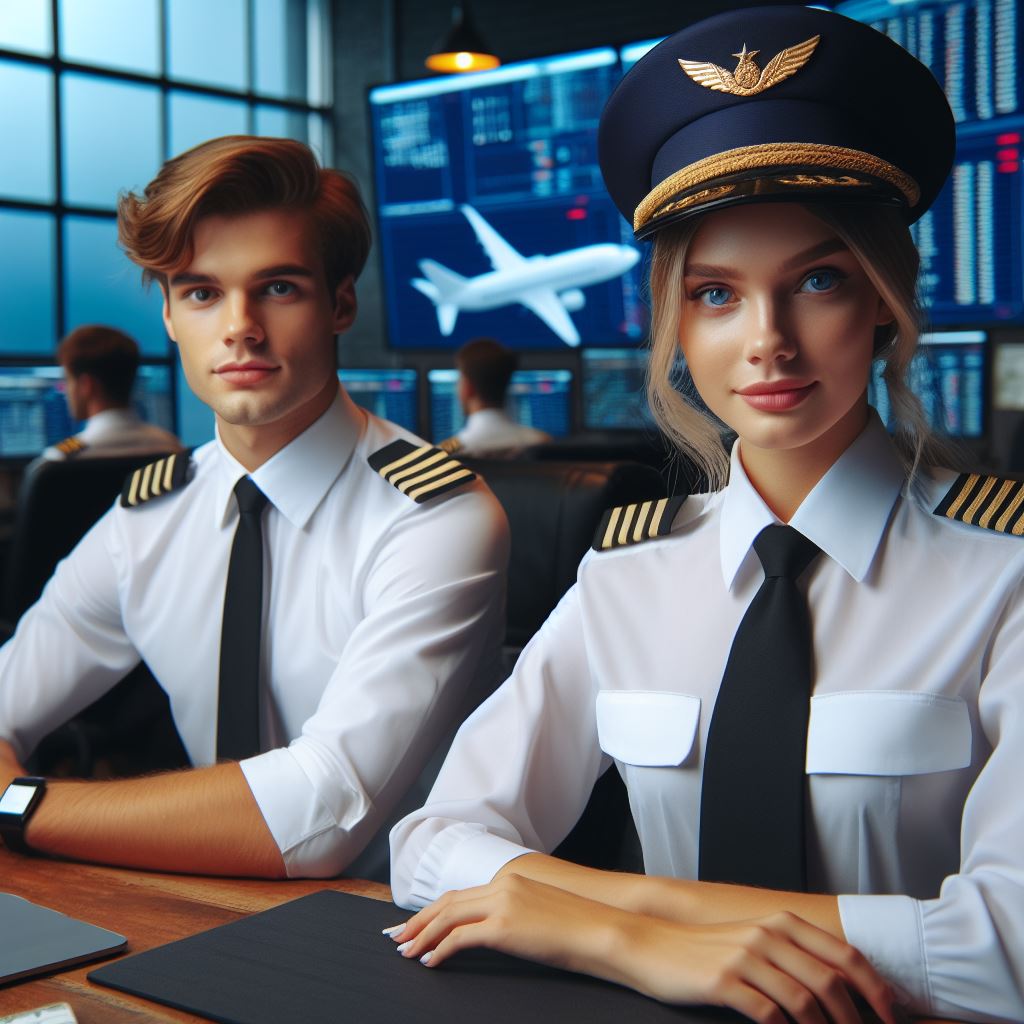Introduction
Navigating the complexities of life as an Australian airline pilot entails a delicate equilibrium between professional demands and personal well-being.
The role encompasses not only the exhilarating experience of soaring through the skies but also the inherent challenges of extended duty hours, unpredictable schedules, and significant time spent away from home and loved ones.
Recognized as one of the paramount priorities in the aviation industry, maintaining work-life balance assumes profound significance for Australian airline pilots.
Beyond its intrinsic value in promoting physical and mental health, achieving harmony between professional obligations and personal life serves as a cornerstone for sustained career longevity, operational efficiency, and nurturing fulfilling relationships outside the cockpit.
In recent years, the discourse surrounding work-life balance has gained considerable traction, underscoring its pivotal role in fostering holistic well-being among professionals across various sectors.
However, the aviation industry presents unique circumstances that warrant specialized attention when addressing this equilibrium, particularly for pilots who shoulder immense responsibility for the safety and comfort of passengers amidst the rigors of flight operations.
In a nutshell, the quest for work-life balance is an ongoing journey fraught with complexities and nuances, particularly for Australian airline pilots who traverse the skies in service of a global clientele.
Yet, amidst the myriad challenges and demands that define their profession, the pursuit of equilibrium remains not only a personal imperative but also a collective responsibility shared by industry stakeholders, regulatory bodies, and aviation professionals alike.
By prioritizing the holistic well-being of pilots and fostering a culture of support and empowerment, we can endeavor to cultivate a more sustainable and resilient aviation workforce that thrives both in the air and on the ground.
Overview of the Australian Airline Pilot Profession
A career as an Australian airline pilot is both rewarding and challenging, requiring individuals to possess certain skills, qualifications, and training.
Pilots in Australia must meet specific requirements set by the Civil Aviation Safety Authority (CASA), ensuring that they can safely operate aircraft and handle various situations that may arise during flights.
Qualifications and Training
- To become an airline pilot in Australia, aspiring individuals need to obtain a Commercial Pilot License (CPL) or an Airline Transport Pilot License (ATPL).
- The CPL requires candidates to have a minimum of 200 hours of flight time, including at least 100 hours as a pilot in command.
- Alternatively, the ATPL is the highest level of pilot certification and requires a minimum of 1,500 hours of flight time, including significant experience as a pilot in command.
- In addition to flight hours, candidates must also pass theoretical examinations, demonstrating knowledge in areas such as navigation, meteorology, aviation law, and aircraft systems.
- Once the necessary qualifications are obtained, pilots undergo further training with airlines, where they learn specific aircraft operations and procedures.
Responsibilities and Challenges
- Airline pilots bear the immense responsibility of safely operating aircraft and ensuring the well-being of passengers and crew members.
- They must stay alert and focused, constantly monitoring flight instruments and making necessary adjustments to maintain a smooth and efficient flight.
- Pilots need to possess excellent decision-making skills, as they may encounter unexpected situations or adverse weather conditions, requiring quick and accurate judgments.
- The job can be physically and mentally demanding, as pilots often work long hours, deal with time zone changes, and face the pressure of adhering to schedules while ensuring the safety of all on board.
- Crew resource management and effective communication are vital elements of being a pilot, as teamwork and coordination with cabin crew members are crucial for seamless operations.
Attractive Aspects of Being an Airline Pilot in Australia
- One of the most attractive aspects of being an airline pilot in Australia is the sheer joy and freedom of flying.
- Pilots get to experience breathtaking views, travel to various destinations, and enjoy the thrill of navigating through the skies.
- The profession offers excellent career prospects, with opportunities to advance to higher positions, such as becoming a captain or a flight instructor.
- Airline pilots also enjoy competitive salaries and attractive benefits, including travel perks, health insurance, and retirement plans.
- Moreover, the job provides a sense of accomplishment and pride, knowing that pilots play an essential role in connecting people, businesses, and cultures across the globe.
In essence, being an airline pilot in Australia requires dedication, hard work, and a passion for flying. It demands continuous learning, adaptability, and the ability to make critical decisions under pressure.
Despite the challenges, the rewards of being an Australian airline pilot are boundless, offering a fulfilling career that combines adventure, responsibility, and the opportunity to make a difference in the world of aviation.
Challenges in balancing life as an airline pilot
The irregular working hours and shift rotations
- Airline pilots often have to work irregular hours and go through shift rotations.
- This can disrupt their sleep patterns, making it difficult to maintain a consistent daily routine.
- Working night shifts can be especially challenging as it can affect their overall health and wellbeing.
- It can be challenging for pilots to plan personal activities and commitments due to their unpredictable schedules.
- Pilots may have to sacrifice important events or miss out on spending time with loved ones due to work commitments.
- The irregular working hours also make it challenging to establish a stable work-life balance.
- Constantly adjusting to different schedules can take a toll on the pilot’s physical and mental health.
The impact of long flights and time zone adjustments on personal life
- Long flights and frequent time zone adjustments can have a significant impact on an airline pilot’s personal life.
- Jet lag is a common issue faced by pilots due to rapid changes in time zones.
- It can lead to fatigue, sleep problems, and difficulty in adjusting to local time upon reaching their destination.
- Pilots may experience difficulties in maintaining personal relationships due to constant travel and time zone differences.
- Being away from home for extended periods can put a strain on family relationships and create a sense of isolation.
- Pilots may miss out on important family events, birthdays, anniversaries, and other special occasions.
- It requires careful planning and good communication skills to balance personal commitments and the demands of the job.
The stress and pressure associated with the profession
- The profession of an airline pilot comes with tremendous stress and pressure.
- Pilots have the responsibility of ensuring the safety of all passengers and crew onboard.
- They need to make critical decisions quickly, especially in emergency situations.
- The constant need to stay alert and focused can lead to high levels of mental and physical strain.
- Pilots need to undergo extensive training and pass rigorous examinations, adding to the pressure.
- The profession also comes with the fear of making mistakes that could have severe consequences.
- Pilots must cope with the stress of long flights, challenging weather conditions, and demanding schedules.
Lastly, balancing life as an airline pilot can be extremely challenging due to irregular working hours, shift rotations, long flights, time zone adjustments, and the stress associated with the profession.
It requires strong adaptability, effective time management, and open communication with loved ones to maintain a healthy work-life balance.
Read: How to Become a Train Driver in Australia
Strategies for achieving work-life balance as an airline pilot
The importance of effective time management
- Prioritize tasks and create a schedule to ensure efficient use of time.
- Set realistic goals and deadlines to avoid feeling overwhelmed and maintain a sense of accomplishment.
- Delegate tasks when possible to lighten the workload and create more free time.
- Avoid multitasking as it can lead to decreased productivity and increased stress.
- Take regular breaks to rest and recharge, enhancing overall productivity and preventing burnout.
- Utilize technology and time-saving tools to streamline tasks and optimize efficiency.
- Learn to say no to non-essential commitments to avoid overextending oneself.
Tips for maintaining a healthy lifestyle despite irregular schedules
- Prioritize sleep by establishing a consistent sleep routine and ensuring sufficient rest.
- Engage in regular exercise to reduce stress, improve mental clarity, and enhance overall well-being.
- Plan meals ahead and prioritize nutritious food options to support physical and mental health.
- Stay hydrated throughout the day to maintain optimal body functions and combat fatigue.
- Practice relaxation techniques such as meditation or deep breathing to manage stress and promote relaxation.
- Set aside time for hobbies and activities that bring joy and provide an outlet for personal interests.
- Foster relationships with colleagues to create a sense of camaraderie and support in the workplace.
The significance of support networks and communication with loved ones
- Maintain open lines of communication with family and friends to foster healthy relationships and emotional support.
- Plan regular quality time with loved ones to strengthen bonds and create lasting memories.
- Seek support from fellow airline pilots who understand the unique challenges and demands of the profession.
- Consider joining support groups or seeking professional counseling to address any emotional or psychological challenges.
- Establish boundaries between work and personal life to ensure time is dedicated to loved ones.
- Practice active listening and empathy to strengthen relationships and demonstrate care for others.
- Engage in hobbies or activities that can be enjoyed with loved ones to further nurture relationships.
By implementing effective time management strategies, prioritizing a healthy lifestyle, and nurturing support networks, airline pilots can achieve a better work-life balance.
Balancing the demands of the profession with personal well-being is crucial for long-term success and happiness in both personal and professional aspects of life.
Read: Day in the Life of an Aussie Train Driver

Explore Further: Networking Tips for Aussie Logistics Pros
Resources and Support Available for Airline Pilots in Australia
Role of Airlines in Supporting Work-Life Balance Initiatives
- Airlines recognize the importance of work-life balance for their pilots.
- They implement policies and programs to support their pilots’ well-being.
- Flexible scheduling options allow pilots to spend time with their families and pursue personal interests.
- These initiatives aim to prevent burnout and enhance pilots’ overall quality of life.
Employee Assistance Programs and Mental Health Support
- Airlines provide employee assistance programs (EAPs) to support pilots’ mental health.
- EAPs offer confidential counseling services to address personal or work-related issues.
- Pilots can access professional help for stress, anxiety, or other mental health concerns.
- Regular mental health check-ups are encouraged to detect and address any potential problems early.
Seeking Professional Help when Needed
- It is crucial for pilots to recognize when they need professional help.
- Seeking assistance is a sign of strength and a commitment to personal well-being.
- Airlines promote a culture of open communication and encourage pilots to reach out.
- Professional help ensures pilots can cope with stress and maintain their mental and emotional health.
Pilots in Australia have access to a range of resources and support systems that help them maintain a healthy work-life balance.
Airlines play a significant role in supporting their pilots’ well-being by implementing various initiatives.
These initiatives include flexible scheduling options that allow pilots to allocate time for their personal lives and hobbies, thereby reducing the risk of burnout and enhancing their overall quality of life.
Additionally, airlines recognize the importance of mental health in the aviation industry.
They provide employee assistance programs (EAPs) that offer confidential counseling services to address any personal or work-related issues pilots may face.
These programs ensure that pilots have access to professional help for stress, anxiety, or other mental health concerns.
Regular mental health check-ups are encouraged to detect and address any potential problems early.
It is crucial for pilots to understand the importance of seeking professional help when needed.
Recognizing the signs of distress and taking appropriate action is a sign of strength and a commitment to their personal well-being.
Airlines promote a culture of open communication and provide resources that encourage pilots to reach out and seek assistance when necessary.
Seeking professional help ensures that pilots can effectively cope with stress and maintain their mental and emotional health.
Read: Trucker Tales: Stories from the Road
Learn More: From Classroom to Cockpit: Pilot Education in AU
Stories and Experiences from Australian Airline Pilots
Anecdotes and Interviews: Balancing Life as an Australian Airline Pilot
- Joe, a senior airline pilot, shared his secret to balance by prioritizing family time.
- “I make sure to reserve at least two weekends a month to spend quality time with my wife and children,” he said.
- Sarah, a young pilot, mentioned the importance of self-care and mental well-being in her interviews.
- “I practice mindfulness and meditation regularly to stay grounded and maintain a healthy work-life balance,” she revealed.
- Mark, an experienced pilot, spoke about the challenges of maintaining relationships while being away from home frequently.
- “Communication and understanding are crucial. I always make an effort to stay connected with my loved ones,” he emphasized.
Approaches and Insights from Australian Airline Pilots
- Lisa, a pilot with over a decade of experience, emphasized the significance of setting clear boundaries at work.
- “I maintain a strict schedule, ensuring I have scheduled breaks to rest and recharge,” she shared.
- Tom, another pilot, spoke about the importance of engaging in hobbies or pursuits outside of aviation.
- “Having a hobby helps me decompress and maintain a sense of identity beyond being a pilot,” he explained.
- Olivia, a pilot transitioning to a management role, highlighted the need for effective time management skills.
- “I plan my days meticulously, ensuring I allocate enough time for work, rest, and personal commitments,” she said.
Lessons Learned and Recommendations from Australian Airline Pilots
- One recurring lesson was the importance of fostering open communication with family and friends.
- Pilots unanimously stressed the need to keep loved ones in the loop about their schedules and challenges.
- Prioritizing physical and mental health was another common recommendation among pilots.
- Regular exercise, a balanced diet, and seeking professional support when needed were frequently mentioned strategies.
- Many pilots also highlighted the significance of making the most of the time spent at home or on layovers.
- Exploring the local culture, engaging in sightseeing, and trying new activities were suggested as ways to make the most of downtime.
Challenges Faced and Strategies to Overcome Them
- One common challenge mentioned by pilots was the irregular and demanding work schedules.
- To cope, some pilots developed effective time management techniques to maximize their rest and leisure time.
- Developing a strong support system was another strategy mentioned by pilots.
- Connecting with other pilots through professional networks and sharing experiences helped them overcome the isolation.
- Finding a balance between work and personal life was an ongoing challenge for many pilots.
- Being adaptable, resilient, and having a positive mindset were often cited as essential qualities to navigate these challenges.
In fact, balancing life as an Australian airline pilot requires careful prioritization, effective communication, and self-care. Each pilot has unique approaches and insights, demonstrating the variety of strategies used to achieve a healthy work-life balance.
Despite the challenges, Australian airline pilots continually strive to maintain fulfilling personal lives while pursuing their passion for aviation.
Read: Salary Insights for Train Drivers in Oz
Conclusion
The significance of maintaining work-life balance as an Australian airline pilot cannot be overstated.
It serves as the linchpin for ensuring not only the physical and mental well-being of pilots but also the safety and efficiency of flight operations.
By striking a harmonious equilibrium between professional responsibilities and personal life, pilots can cultivate resilience, foster meaningful relationships, and sustain fulfilling careers in aviation.
To aspiring pilots contemplating a career in aviation, I urge you to approach the profession with a keen awareness of the importance of work-life balance.
While the allure of flying may be irresistible, it is essential to recognize the inherent challenges and sacrifices involved.
By proactively prioritizing self-care and seeking out airlines that prioritize employee well-being, you can embark on a fulfilling journey in aviation while safeguarding your holistic well-being.
As we navigate the ever-evolving landscape of the aviation industry, let us remain steadfast in our commitment to promoting a culture of work-life balance and support.
Advocating for fatigue management, implementing flexible schedules, and fostering a caring community can shape pilots’ sustainable future.
Together, let us strive to soar to new heights, both professionally and personally, as we embark on this shared journey in the skies.




